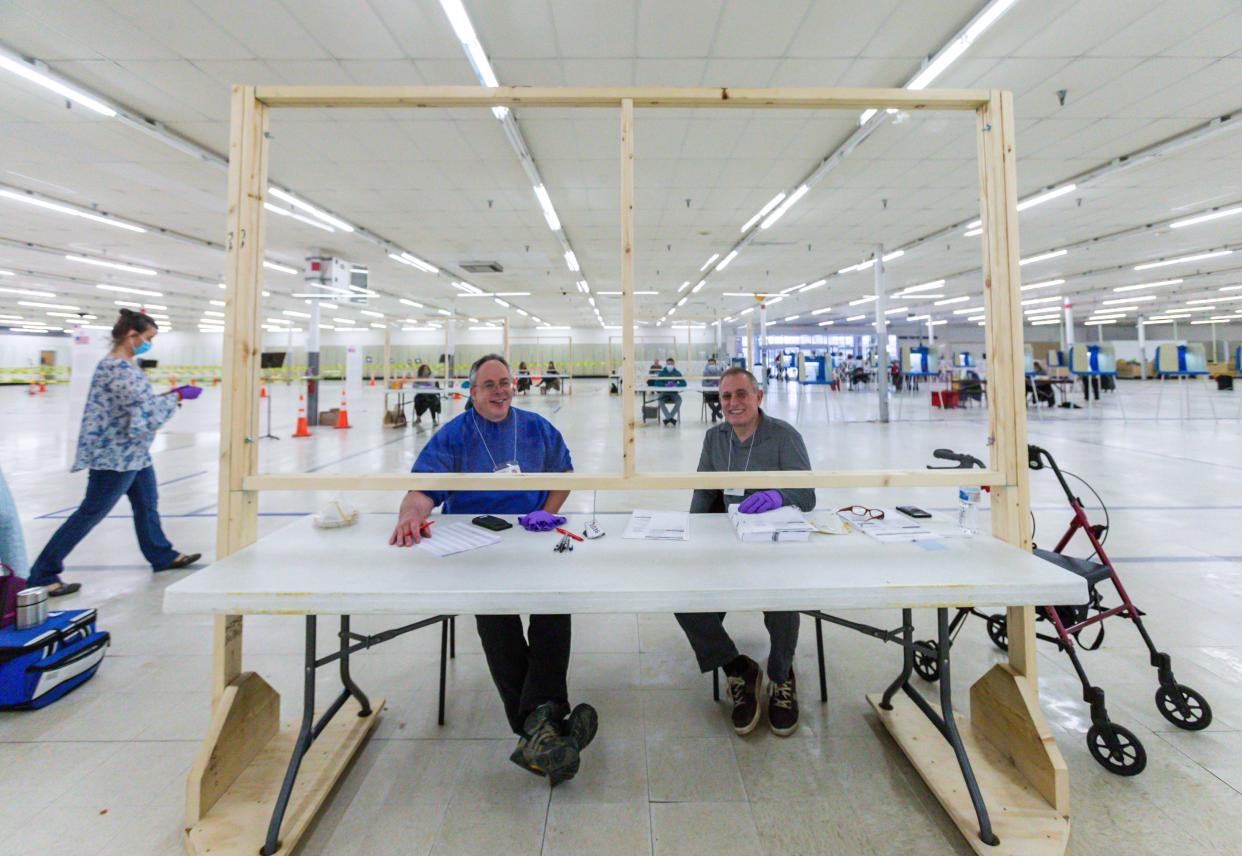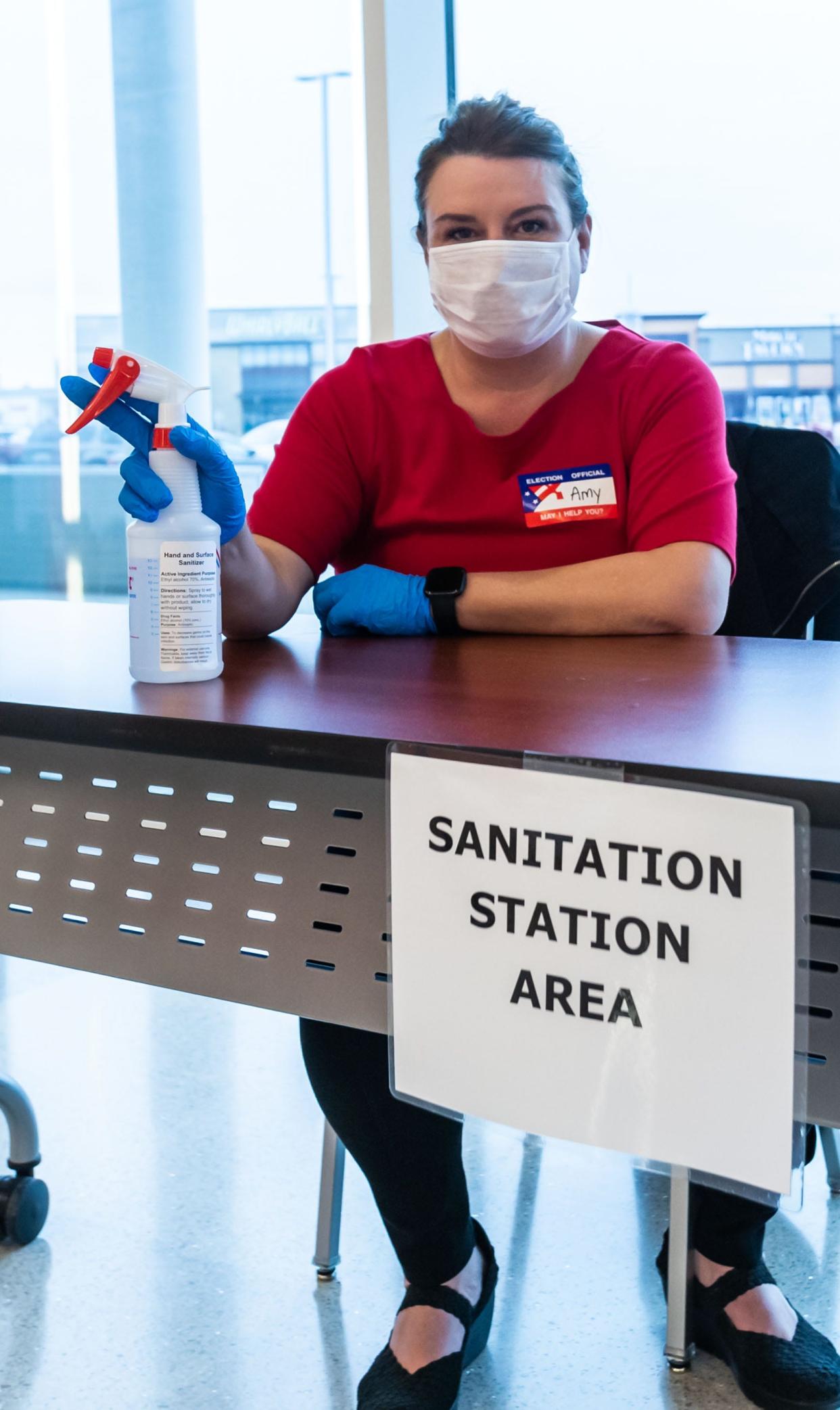Wisconsin's April 2 referendum questions and the 'Zuckerbucks' debate, explained

Wisconsin's presidential primary election is April 2, and voters will see two referendum questions on their ballots that ask about the use of private funds in election administration and the role of election officials.
But what do they mean, and why are they on the April ballot?
The questions come from a proposal authored by Republicans in the state Legislature, which got final votes in November. The votes were along party lines, with Republicans supporting it and Democrats opposing it.
The proposal is rooted in Republicans' longstanding scrutiny of millions of dollars in private grants, which they often call "Zuckerbucks." The bulk of the money went to the state's five largest cities to help them run elections during the COVID-19 pandemic.
Here's what to know about the debates behind the two referendum questions you'll see on your April ballot:
What are the statewide referendum questions on my ballot?
The questions will appear on the ballot as follows. You can find a preview of your ballot at myvote.wi.gov.
QUESTION 1: "Use of private funds in election administration. Shall section 7 (1) of article III of the constitution be created to provide that private donations and grants may not be applied for, accepted, expended, or used in connection with the conduct of any primary, election, or referendum?"
QUESTION 2: "Election officials. Shall section 7 (2) of article III of the constitution be created to provide that only election officials designated by law may perform tasks in the conduct of primaries, elections, and referendums?"
What's the debate behind the referendum about private donations and grants?
The referendums stem from grants distributed in 2020 by the Center for Tech and Civic Life, which is funded by Facebook founder Mark Zuckerberg and his wife, Priscilla Chan.
More than 200 communities in Wisconsin got shares of the $10.6 million, and $8.8 million went to Milwaukee, Madison, Green Bay, Racine and Kenosha — the state's five largest cities.
"What that does is gins up a turnout effort in a particular place that can put the thumb on the scale for statewide elections or local elections," said Sen. Eric Wimberger, a Republican from Green Bay, who authored the proposal.
Many smaller communities also received grants, including in Republican areas like Waukesha County. Waukesha received $42,000, which it used to help cover increased mailing costs, tables, rolling partitions and equipment.
Conservatives launched legal challenges over the grants, and courts ruled multiple times that there was nothing in state law that prohibited clerks from taking the money. Bipartisan members of the Wisconsin Elections Commission also upheld the grants.
Sen. Mark Spreitzer of Beloit, the ranking Democrat on the Senate's elections committee, said the first question would be "actively harmful" if it passes, because it would take away resources from clerks.
"If we're serious about not wanting clerks to have to go out and find private sources of funding, then we should provide state dollars to make sure that their needs are met," Spreitzer said. "And there's nothing in this amendment that would do that."
What's the debate behind the referendum about the roles of election officials?
The second question is based around Republicans' scrutiny of Michael Spitzer-Rubenstein, a consultant with the National Vote at Home Institute who helped some of the cities. In Green Bay, he advised officials on how to make their election run more smoothly, but had no decision-making authority, the city said.
He was listed as the contact to pick up keys at the KI Convention Center, where the city counted absentee ballots, but was never given the keys. And when he was stationed there on Election Day, he wore a name tag that identified him as a city employee rather than a consultant.
Wimberger and other Republicans have argued his work amounted to administering an election.
"That sort of thing just is not appropriate," Wimberger said. "There has to be people who are held to a particular standard by statute running these elections."
Spreitzer shared an analysis from the Legislature's nonpartisan attorneys that said the impact of adding the language to the constitution is unclear. State law already says that only appointed election officials can conduct elections, but doesn't say what activities count as conducting an election. The referendum doesn't specify that, either.
"I don't think we should be putting things into our constitution that don't add clarity or that add further confusion," Spreitzer said.
Diane Coenen, the clerk for Oconomowoc, said she couldn't see herself reaching out to a consultant about how to run elections, because resources and training materials from government agencies are available. But clerks should have the discretion to hire poll workers, who take oaths, she said.
"Our judgment needs to be respected," Coenen said in an interview. "We should be allowed to make the decision of who's going to help us run the election, because we can't do it alone."

How did Wisconsin clerks use private grant money in 2020?
Clerks have said the grants helped with unexpected costs during the onset of the pandemic. That included ballot supplies and postage for an increase in absentee voters they hadn't budgeted for, and personal protective equipment like masks and hand sanitizer for poll workers.
Racine used its grant to buy a mobile voting van that met voters in neighborhoods and collected early ballots, which faced legal challenges. Some cities used the funding to purchase drop boxes, which were since banned in Wisconsin but could be ruled legal again.
Madison had not yet spent its $1.5 million in funds from the center, the Cap Times reported in November. If the referendum passes, the city wouldn't be able to use it.
And Milwaukee is seeking a nearly $800,000 grant from Cities Forward, a nonprofit organization that hasn't yet released its donors. The funding would be used in part to purchase two tabulators that count absentee ballots.
A bill that would have allowed clerks to start processing absentee ballots the Monday before an election didn't pass the Senate this session — two Republicans have said Milwaukee will need to work faster to count ballots.
Would the state give more funding if clerks need it?
That was a point of debate in a public hearing for the proposal. One Republican said he would prefer spending more as a taxpayer so local governments can fund elections, rather than take in private grants.
"We feel elections are not adequately funded, from the federal level to the state to locally. We make do. Everyone is facing budget constraints," said Coenen said, noting other members of the Wisconsin Municipal Clerks Association agreed.
"If we accepted grants from an entity, that doesn't mean we would cede control of our elections by accepting the money," she said. "Every clerk in the state tries very hard to run ethical, nonpartisan, fair, transparent elections."
Recent efforts to give election officials more state funding have stalled or failed. A bipartisan bill to help communities meet the costs of unpredictable special elections didn't make it through this session. Spreitzer also noted Republicans rejected funding for electronic poll books during the state budget process.
Have other states banned private grant money?
Since the 2020 election, 27 states have passed laws to "prohibit, limit or regulate the use of private or philanthropic funding to run elections," according to the National Conference of State Legislatures.
Those states are mostly red — like Texas, Florida and Iowa — but also include more purple states like Pennsylvania and North Carolina.
In 2021, Democratic Gov. Tony Evers vetoed a Republican-authored bill that would have barred local governments from applying for or accepting outside funding. The Wisconsin Elections Commission, however, could accept grants and allocate them based on population.
"Our election laws are robust and lay out clear procedures for how municipal and county officials must administer an election, a process that is not threatened by a municipality applying for and accepting additional resources," Evers said at the time.
Wimberger said the constitutional amendment is "a direct result of the fact that Evers vetoed that bill," now sending it to voters to decide.
Why is the referendum happening four years later?
While the grants were a response to the pandemic that began in 2020, it took a few years for Republicans to place the questions on the ballot in Wisconsin.
Because the proposal is a constitutional amendment, it needs to pass two sessions of the Legislature in a row. This fall marked the second round, and it first passed in February 2022.
If the referendums pass, when would the changes take effect?
If a majority of Wisconsin voters approve the referendums, the changes would take effect almost immediately. Once the results of the April 2024 election are certified, the new parts of the constitution would be in place.
That means restrictions on private grants would be in effect for the August primary and November general election, plus any special or recall elections that happen before then. Milwaukee is moving to use its new grant money before April 2.
What are the other referendums in Wisconsin in the 2024 elections?
Voters will see another election-related referendum question on their Nov. 5 ballot. One would clarify that only U.S. citizens are eligible to vote in Wisconsin, rather than "every U.S. citizen" 18 and older, which is how the state constitution is currently written. That proposal is also authored by Republicans.
Some states and cities have moved to allow non-citizens to vote in local elections, but state laws don't allow for that in Wisconsin. But there have been instances in Wisconsin, including a Ukrainian woman who was charged with election fraud after trying to vote in Mequon's school board election.
And on the Aug. 13 ballot, two other referendum questions will ask voters to give the Legislature more power over distributing federal funding, which the governor currently has sole authority over. Republican lawmakers have repeatedly clashed with Evers, a Democrat, about to distribute pandemic relief money.
More: What are Wisconsin's 2024 elections, and when are they? Four dates to put on your calendar.
This article originally appeared on Milwaukee Journal Sentinel: Wisconsin election guide to April 2 referendum questions, 'Zuckerbucks' debate
